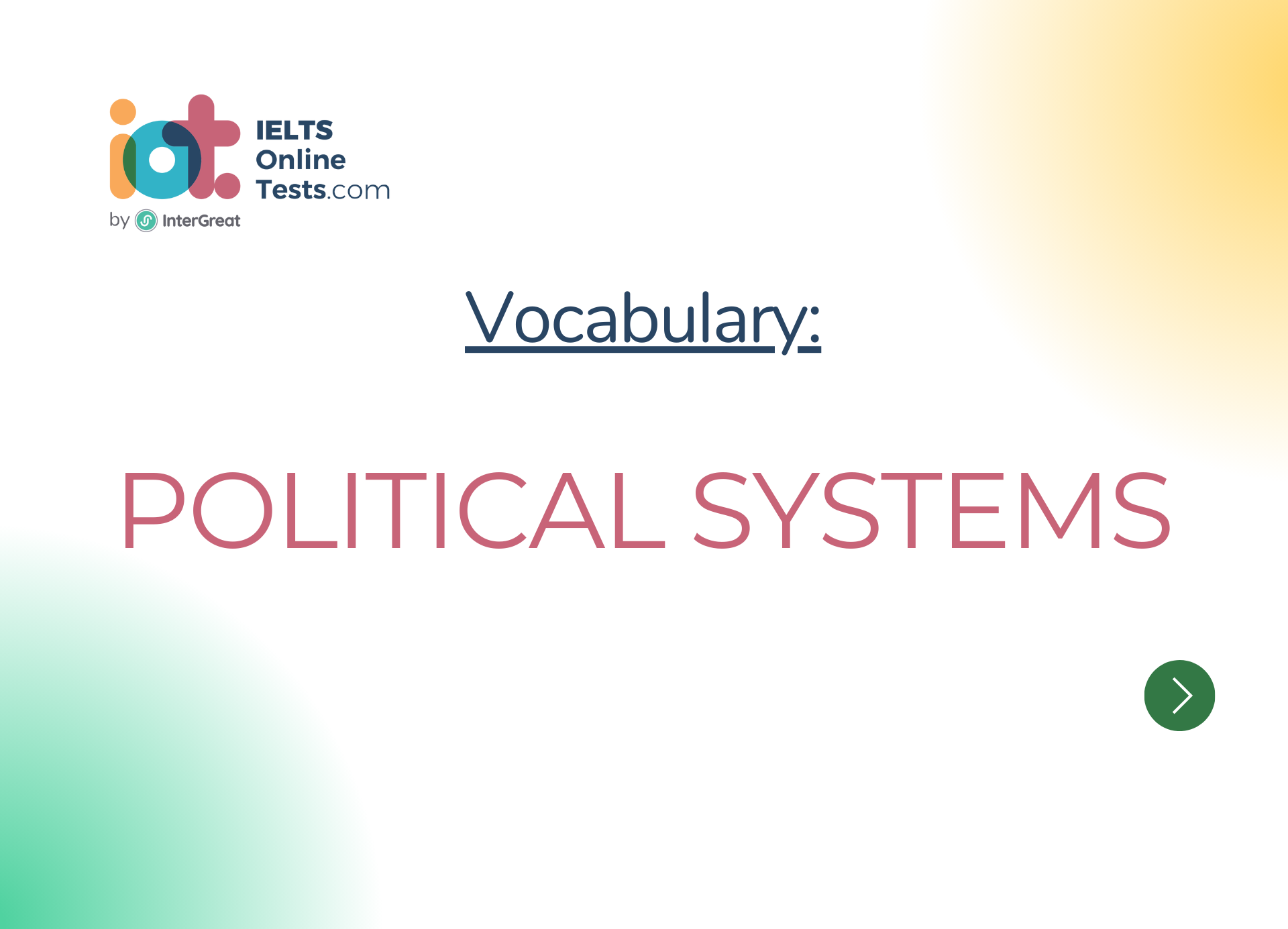
Political systems
Here are some vocabulary words related to political systems for IELTS band scores 4.5-6.0:
Democracy:
A political system where the power is vested in the hands of the people, either directly or through elected representatives.
Republic:
A form of government in which the country is considered a "public matter," and elected officials represent the interests of the citizens.
Monarchy:
A political system where a single ruler, such as a king or queen, holds supreme authority over the state.
Constitution:
The fundamental laws and principles that govern a country and establish the structure of its government.
Constitutional Monarchy:
A monarchy that operates under a constitution that limits the powers of the ruler.
Authoritarianism:
A political system characterized by strict obedience to authority, often with limited political freedoms for citizens.
Totalitarianism:
A highly centralized political system where the government exercises complete control over all aspects of public and private life.
Oligarchy:
A political system in which power is concentrated in the hands of a small, privileged group or elite.
Federalism:
A system of government in which power is divided between a central authority and various regional or state governments.
Unitary State:
A political system where power is concentrated in the central government, and regional governments have limited autonomy.
Parliamentary System:
A political system in which the executive branch is accountable to the legislature, and the head of government is usually the leader of the majority party in parliament.
Presidential System:
A political system in which the president is the head of government and head of state, elected separately from the legislature.
One-Party State:
A political system where only one political party is legally allowed to govern, and opposition parties are restricted or banned.
Multi-Party System:
A political system with several political parties, often leading to coalition governments.
Political Ideology:
A set of beliefs and values that guide political decision-making and policy positions.
Bicameral Legislature:
A legislative body with two separate chambers or houses.
Unicameral Legislature:
A legislative body with a single chamber or house.
Veto:
The power of a president or other executive authority to reject a proposed law or bill.
Suffrage:
The right to vote in political elections.
Political Participation:
Involvement of citizens in political activities, such as voting, joining political parties, or engaging in advocacy.
Political Rights:
Civil liberties and freedoms related to political participation and expression.
Political Stability:
The ability of a government to maintain continuity and avoid turmoil or unrest.
Political Activism:
The involvement of individuals or groups in actions aimed at influencing political decisions or policies.
Political Campaign:
Organized efforts to promote a candidate or political cause during an election.
Civic Engagement:
Active involvement of citizens in their communities and in public affairs.
Public Policy:
The course of action or decisions adopted and implemented by a government to address public issues.
Political Accountability:
The responsibility of government officials to be answerable for their actions and decisions.
Separation of Powers:
The division of government powers among different branches, such as executive, legislative, and judicial.
Rule of Law:
The principle that all individuals and institutions are subject to and accountable to the law.
Political Representation:
The act of elected officials representing the interests and views of their constituents.
Political Rights:
Basic human rights that are related to political participation and expression.
Political Freedom:
The absence of coercion or oppression in political decision-making.
Political Sovereignty:
The supreme authority and independence of a state to govern itself.
Cabinet:
A group of senior government officials appointed by the prime minister or president to make collective decisions and policies.
Electoral System:
The rules and methods used to conduct elections and determine the allocation of seats in a legislature.
Coalition Government:
A government formed by two or more political parties working together to achieve common goals.
Referendum:
A direct vote by the electorate on a specific issue or proposal.
Coup d'état:
The sudden and illegal overthrow of a government, usually by a military faction.
Political Dissent:
Expressions of disagreement or opposition to government policies or actions.
Political Campaign:
Organized efforts to promote a candidate or political cause during an election.
Political Corruption:
The misuse of public office for personal gain or the manipulation of government institutions for illicit purposes.
Political Lobbying:
Efforts to influence government officials or policies on behalf of a particular group or interest.
Political Rhetoric:
Language used by politicians to persuade and influence public opinion.
Political Debates:
Formal discussions between candidates or parties on political issues and policies.
Voting System:
The method used to cast and count votes in an election.
Election Commission:
An independent body responsible for overseeing and conducting elections.
Election Fraud:
Illegal actions to manipulate election results.
Political Analysis:
The examination and evaluation of political events and policies.
Political Economy:
The study of the relationship between politics and economics.
Campaign Finance:
The financing of political campaigns and activities.
Remember to practice using these vocabulary words in various contexts to enhance your language skills for the IELTS exam. Good luck with your preparation!




